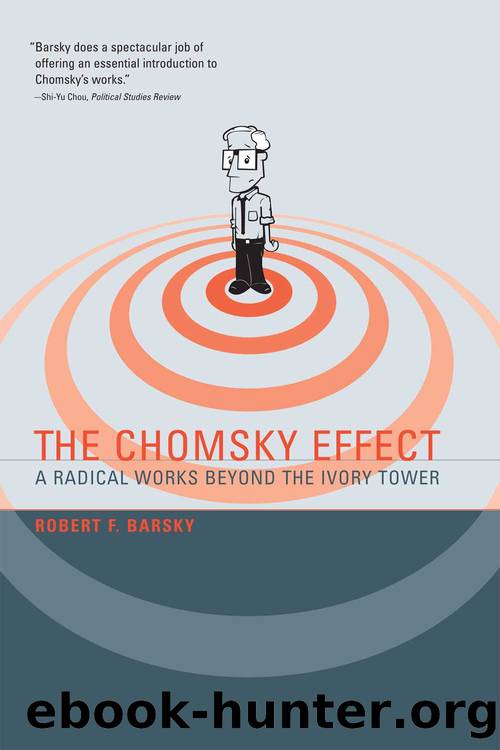The Chomsky Effect: A Radical Works Beyond the Ivory Tower (The MIT Press) by Robert F Barsky

Author:Robert F Barsky
Language: eng
Format: azw3
ISBN: 9780262026246
Publisher: MIT Press
Published: 2009-09-18T05:00:00+00:00
Rule of Law versus Exceptions in Law
The statements Chomsky makes about classical liberalism are often challenged in the current postmodern setting, in which subjectivity, the possibility of communication, and a sense of common values are called into question on the basis of the indeterminate and unstable subject. The idea that âmutual agreementsâ could exist between âfree and equalâ individuals, necessarily constituted as stable subjects with consistent and knowable needs and desires, and upheld by international organs such as international law, has been everywhere upset by postmodern and poststructuralist thought. This is not an area into which I will venture at any length, but instead would suggest that the reader refer to the debate between those who, from a postmodern perspective, uphold the idea that we need ample discretion in law46 and those who consider such a heavily discretion-based system as a menace to fundamental rights and freedoms,47 and thus consider that it was no accident that the early advocate of this approach, Karl Schmitt, was the architect of Nazi law.
In line with this anti-postmodern idea that we need stable, consistent, and founded laws that would be applied in a formal fashion across time and space, William Scheuerman suggests in Between the Norm and the Exception: The Frankfurt School and the Rule of Law48 that the tendency in most Western states is to move away from a classical liberal notion of rule of law, with its insistence upon consistent and universal legal norms, and toward a form of law that âtakes an increasingly amorphous and indeterminate structure as vague legal standards like âin good faithâ or âin the public interest,â proliferateâ (1). Scheuerman claims that Franz Neumann and Otto Kirchheimer, who were both associated with the Frankfurt Institute for Social Research in the late 1930s and 1940s, saw in this trend a danger that was confirmed in the reliance of the Nazi state upon the work of scholars such as Carl Schmitt and Friedrich Hayek for the elaboration of a legal system appropriate for Nazi Germany. Schmitt's idea was to infuse huge state or legal discretion into cases as a way of combating formal law, an idea that has been revitalized of late by the left (especially Paul Piccone and G. L. Ulman in Telos), the right (William Buckley and Paul Gottfried in the National Review), by various postmodern historians and writers, and by mainstream writers including Joseph Bendersky and George Schwab. Scheuerman's book has implications beyond either a social history of Germany or a more adequate appraisal of the Frankfurt School, because he discusses the inherent dangers of a legal system that relies upon situation-specific administrative decrees, or upon interpretations of claims that depend upon notions such as custom, indwelling right, morality, fairness, or discretion. The danger of âextensive state intervention in an unprecedented variety of spheres of social and economic activityâ is that the division between state and society is undermined, reducing the degree to which government action can be deemed predictable or, to use Rocker's conception, legitimate.
The link
Download
This site does not store any files on its server. We only index and link to content provided by other sites. Please contact the content providers to delete copyright contents if any and email us, we'll remove relevant links or contents immediately.
Spell It Out by David Crystal(36021)
Life for Me Ain't Been No Crystal Stair by Susan Sheehan(35720)
Cecilia; Or, Memoirs of an Heiress — Volume 1 by Fanny Burney(32412)
Cecilia; Or, Memoirs of an Heiress — Volume 3 by Fanny Burney(31822)
Cecilia; Or, Memoirs of an Heiress — Volume 2 by Fanny Burney(31800)
The Great Music City by Andrea Baker(31249)
Professional Troublemaker by Luvvie Ajayi Jones(29571)
We're Going to Need More Wine by Gabrielle Union(18951)
The Secret History by Donna Tartt(18805)
Twilight of the Idols With the Antichrist and Ecce Homo by Friedrich Nietzsche(18477)
All the Missing Girls by Megan Miranda(15489)
Cat's cradle by Kurt Vonnegut(15152)
Pimp by Iceberg Slim(14318)
Bombshells: Glamour Girls of a Lifetime by Sullivan Steve(13952)
Talking to Strangers by Malcolm Gladwell(13185)
Norse Mythology by Gaiman Neil(13169)
Fifty Shades Freed by E L James(13145)
For the Love of Europe by Rick Steves(12640)
The Social Justice Warrior Handbook by Lisa De Pasquale(12126)
